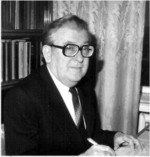
World science has suffered an irretrievable loss. A prominent theorist in physics, brilliant individual, (Oleksij Sytenko) passed away on February 11, 2002, one day before his 75th birthday. Alexej Sitenko was born on February 12, 1927, in the Novi Mlyny village of the Baturyn region in Chernihivshchyna, Ukraine. In 1949 he graduated from Kharkiv State University and continued his postgraduate studies under the supervision of academician Akhiezer. In 1952 he became Ph.D., in 1959 - Doctor of Science in Physics and Mathematics. During the years 1952-1959 he was assistant professor and in 1960-1961 - full professor in the theoretical physics department of Kharkiv University. Since 1968 Professor Sitenko has worked at the Bogolyubov Institute for Theoretical Physics of the National Academy of Sciences of Ukraine, since 1988 he has been the Director of the Institute. Prof. Sitenko's scientific interests concerned mainly theoretical nuclear physics and plasma theory. He was a pioneer in the development of the kinetic theory of plasmas with external magnetic fields. He was the first who obtained the plasma dielectric permittivity tensor in the kinetic approximation and employed the results to formulate the most general dispersion equations for waves in magnetoactive plasmas with regard for particle thermal motion. Professor Sitenko has made basic contribution in the development of the statistical theory of electromagnetic processes in plasma-like media. He predicted the phenomenon of combination wave scattering in plasmas and developed a theory of induced wave scattering taking into account the parametric effect of the external field and nonlinear saturation of induced fields. Professor Sitenko obtained significant results in theoretical nuclear physics. His fundamental contribution in the theory of high-energy particle-nucleus interactions is of basic importance. His theory of diffraction nuclear processes is called "Sitenko-Glauber method" in literature and is widely used to draw information on the nuclear structure. In terms of this theory, he predicted a new physical phenomenon, deuteron diffraction dissociation, that was later confirmed experimentally. Prof. Sitenko formulated the generalized Huygens principle for diffraction hadron-nuclear interactions. He was the first who substantiated the application of phenomenological optical nuclear potentials in terms of microscopic scattering amplitudes. He proposed a comprehensive theory of high-energy nuclear processes in complex nuclear systems of various nature, worked out a theory of inclusive reactions involving light ions. The diffraction theory of multiple scattering, developed by Prof. Sitenko and his school, considerably influenced the studies of the interaction of complex particles with nuclei. Sitenko-Glauber theory is recognized by the specialists in the scientific centers throughout the world. In 1976 he was awarded the K.D.Synelnykov Prize for a series of papers concerning the theory of nuclear reactions. A series of his fundamental papers on the theory of electromagnetic fluctuations and nonlinear wave interactions in plasmas was distinguished by the National Prize of Ukraine in 1992. In 1994 he was awarded (together with O.M.Sharkovsky) the N.N.Bogolyubov Prize for the scattering theory in quantum systems and in one-dimensional dynamical systems. In 1996 Prof. Sitenko was awarded the title of Honored Scientist of Ukraine. In 2000 he was awarded the International Walter Thirring Prize for the great contribution in the development of theoretical nuclear physics. Prof. Sitenko always combined his research work with the education of young scientists. His books, based on the original lecture courses, were used by generations of young theorists to study the fundamentals of nuclear theory, theory of nuclear reactions, physical kinetics, plasma electrodynamics. Of his students, 19 have become Doctors of Sciences in Physics and Mathematics and 46 have obtained the Ph.D. degree. Representatives of his scientific school work in the leading scientific centers in Kyiv, Kharkiv, Dnipropetrovsk, Odesa, Tbilisi, Moscow, Tashkent, Sofia, Prague, Hanoi, Paris, Nancy. Professor Sitenko initiated the international conferences on plasma theory. Fond memories of Professor Sitenko will always live in the hearts of those who knew him.
Editorial Board of NPCS
Copyright © Nonlinear Phenomena in Complex Systems. Last updated: January 9, 2004